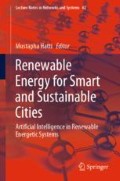Abstract
Variations in load and temperature can cause a thermoelectric generator (TEG) to operate at a voltage that does not produce the maximum possible power for a given temperature difference. Therefore a maximum power point tracker (MPPT) is used to force the generator to a voltage that produces maximum power. This paper presents a comparative simulation study of two important MPPT algorithms specifically perturb and observe and incremental conductance. The Matlab Simulink environment is used to analyze and interpret the simulation results of these algorithms, and therefore show the performance and limitations of each algorithm. As a result, the Incremental conductance method has shown promise as a suitable MPPT algorithm for a TEG subjected to steady state conditions.
Access this chapter
Tax calculation will be finalised at checkout
Purchases are for personal use only
References
Willis, H.L., Scott, W.G.: Distributed Power Generation—Planning and Evaluation, 1st edn. Marcel Dekker, New York (2000). ISBN 0-8247-0336-7
Rahman, S.: Going green: the growth of renewable energy. IEEE Power Energy Mag. 1(6), 16–18 (2003)
Rowe, D.: Thermoelectric waste heat recovery as a renewable energy source. Int. J. Innov. Energy Syst. Power 1, 13–23 (2006)
Dalala, Z.M., Zahid, Z.U.: New MPPT algorithm based on indirect open circuit voltage and short circuit current detection for thermoelectric generators. In: Energy Conversion Congress and Exposition (ECCE), 2015 IEEE, pp. 1062–1067 (2015)
Riffat, S.B., Ma, X.: Thermoelectrics: a review of present and potential applications. Appl. Therm. Eng. 23, 913–935 (2003)
Rowe, D.: Thermoelectrics, an environmentally-friendly source of electrical power. Renew. Energy 16, 1251–1256 (1999)
Phillip, N., Maganga, O., Burnham, K.J., Dunn, J., Rouaud, C., Ellis, M.A., Robinson, S.: Modelling and simulation of a thermoelectric generator for waste heat energy recovery in Low Carbon Vehicles. In: 2012 2nd International Symposium on Environment. Friendly Energies and Applications (EFEA), pp. 94–99 (2012)
Hendricks, T., Choate, W.T.: Engineering Scoping Study of Thermoelectric Generator Systems for Industrial Waste Heat Recovery. Pacifc Northwest National Laboratory, Richland (2006)
Fernandes, A.E.S.S.: Conversão de energia com células de Peltier. Dissertação (Mestrado). Universidade Nova de Lisboa, Lisboa (2012)
Kasa, N., Iida, T., Liang, C.: Flyback inverter controlled by sensorless current MPPT for photovoltaic power system. IEEE Trans. Ind. Electron. 52, 1145–1152 (2005)
Rae-young, K., Jih-Sheng, L.: A seamless mode transfer maximum power point tracking controller for thermoelectric generator applications. IEEE Trans. Power Electron. 23, 2310–2318 (2008)
Esram, T., Chapman, P.L.: Comparison of photovoltaic array maximum power point tracking methods. IEEE Trans. Energy Convers. 22(2), 439–449 (2007)
Dolara, A., Faranda, R., Leva, S.: Energy comparison of seven MPPT techniques for PV systems. J. Electromagn. Anal. Appl. 3, 152–162 (2009)
Pikutis, M., Vasarevicius, D., Martavicius, R.: Maximum power point tracking in solar power plants under partially shaded condition. Elektronika ir Elektrotechnika 20(4), 49–52 (2014)
Lineykin, S., Ben-yaakov, S.: Modeling and analysis of thermoelectric modules. IEEE Trans. Ind. Appl. 43(2), 505–512 (2007)
Josephine, R.L., Padmabeaula, A., Raj, A.D.: Simulation of incremental conductance mppt with direct control and fuzzy logic methods using SEPIC converter. J. Electr. Eng. 13(3), 91–99 (2013)
Femia, F., Petrone, G., Spagnuolo, G., Vitelli, M.: Power Electronics and Control Techniques for Maximum Energy Harvesting in Photovoltaic Systems, pp. 35–84. CRC Press, Boca Raton (2013)
Piegari, L., Rizzo, R.: Adaptive perturb and observe algorithm for photovoltaic maximum power point tracking. IET Renew. Power Gener. 4, 317–328 (2010)
Liu, F., Kang, Y., Zhang, Y., Duan, S.: Comparison of P&O and hill climbing MPPT methods for grid-connected PV generator. In: 3rd IEEE Conference on Industrial Electronics and Applications” 3–5 June 2008; Singapore. IEEE, New York, pp 804–807
Author information
Authors and Affiliations
Corresponding author
Editor information
Editors and Affiliations
Rights and permissions
Copyright information
© 2019 Springer Nature Switzerland AG
About this paper
Cite this paper
Belboula, A., Taleb, R., Bachir, G., Chabni, F. (2019). Comparative Study of Maximum Power Point Tracking Algorithms for Thermoelectric Generator. In: Hatti, M. (eds) Renewable Energy for Smart and Sustainable Cities. ICAIRES 2018. Lecture Notes in Networks and Systems, vol 62. Springer, Cham. https://doi.org/10.1007/978-3-030-04789-4_36
Download citation
DOI: https://doi.org/10.1007/978-3-030-04789-4_36
Published:
Publisher Name: Springer, Cham
Print ISBN: 978-3-030-04788-7
Online ISBN: 978-3-030-04789-4
eBook Packages: Intelligent Technologies and RoboticsIntelligent Technologies and Robotics (R0)

